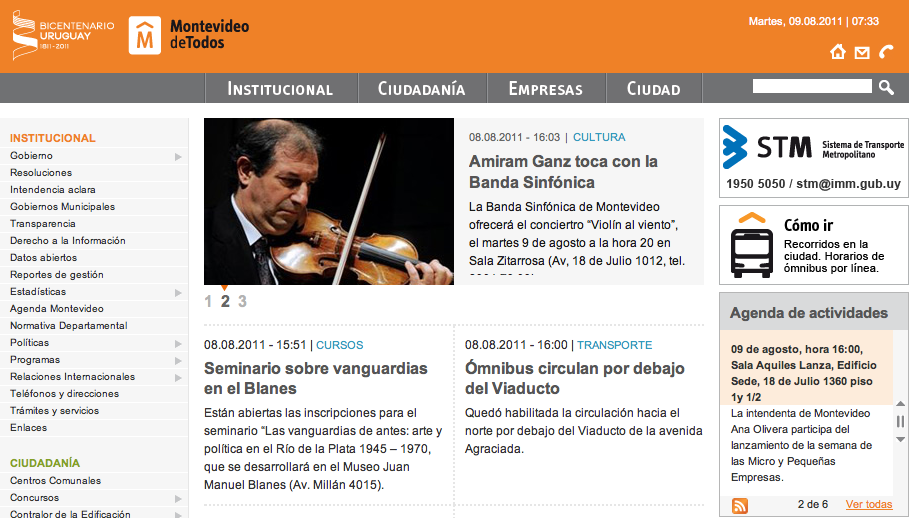The following post is by Guillermo Moncecchi of Intendencia de Montevideo in Uruguay.
Here, in Montevideo, we are proud of our data. The Intendencia de Montevideo drives the economic, social and cultural life of the city, producing data. Lots of data. The government has spent years developing its information services, almost all government processes produce digital data. High quality data: we need it to accomplish our government tasks. As we said, we are proud of them: we have high precision cartography, including every street and every address; we have birth, death and marriage data in the city; we have digitized the placement of libraries, polyclinics, city landmarks, light points… we need them for our work. And, as we do a good work, all these data are accurate and are continuously updated.
As we are proud of our data, a day came when we ask ourselves: why not let others use them? We discussed the idea and decided to embrace the open data principles, removing barriers to information access: we decided that our data should be on the public domain. The city Mayor approved the idea and wrote a resolution stating the open data approach: if it is public, it is open. We then started an open data portal and published the first data sets. From then, we have been continuously working on updating the portal. We listen to people asking for data. We try to satisfy them. Moreover, we are trying to include an open data version of our information as a mandatory product of every software we develop, including the open data idea in the software development cycle.
Yes, we lost some money: before open data, we charged individuals and institutions for the access to our cartography base. Today, an application using OpenStreetMap uses the same cartography we use for our daily work. That is: the best cartography available for Montevideo. For free. That means better services for people in Montevideo. We have eased data exchange with other public institutions: want some data? Just go to the site and get it. Not available? Ok, wait a couple of days and look again… you’ll get the data, and everybody will. It’s public, it’s open. We are about to publish our accounting data: where does my money come from, where does my money go. Digitally, in open formats. For everybody. That is how we think about transparency.
We want to build community. We want our data to be used, because we are responsible for them. People have started using our data: in our portal, we have linked applications buil using our data. People have found mistakes within our data: we corrected them. We are not afraid of errors: we want to solve them.
Going to http://datos.gub.uy we are working with Agesic (the Electronic Government and Information Society Agency of the Uruguayan government), trying to aid in the development of the Uruguayan open data portal. The Uruguayan state has information access laws, but
wants more: if it is public is open. We want to help with our data and our experience.
Lucy is a free range "tech-translator", blogging about her work at http://techtohuman.com/.
Formerly, Lucy worked for Open Knowledge leading School of Data, co-editing the Data Journalism Handbook and coordinating the OpenSpending community.









